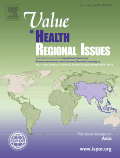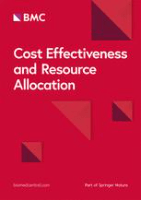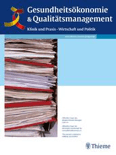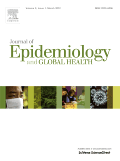
Value in Health Regional Issues
Scope & Guideline
Advancing Value-Based Healthcare Through Regional Insights.
Introduction
Aims and Scopes
- Economic Evaluation of Health Interventions:
The journal publishes studies that assess the cost-effectiveness, cost-utility, and budget impact of various health interventions, helping to inform decisions on resource allocation in healthcare. - Health-Related Quality of Life Research:
A significant focus is on measuring and valuing health-related quality of life (HRQoL) using instruments like EQ-5D and SF-6D, which are crucial for understanding the impact of diseases and treatments on patients' lives. - Regional Health Policy Insights:
The journal emphasizes research that provides context-specific insights into health policies and economic evaluations in low- and middle-income countries, addressing unique regional health challenges. - Patient and Societal Preferences:
Research on patient and societal preferences for health technologies and treatments is highlighted, utilizing methods such as discrete choice experiments to capture the values and trade-offs important to stakeholders. - Impact of Chronic Diseases and Emerging Health Issues:
The journal frequently addresses the economic burden and healthcare utilization associated with chronic diseases, as well as emerging health issues like the COVID-19 pandemic, focusing on their economic implications.
Trending and Emerging
- Post-Pandemic Health Economics:
There is a marked increase in studies examining the economic impact of the COVID-19 pandemic on healthcare systems, resource utilization, and long-term health outcomes, reflecting the need to understand and mitigate the pandemic's effects. - Value-Based Healthcare Models:
Emerging research is increasingly focused on value-based healthcare frameworks, assessing how care delivery models can be optimized to improve patient outcomes while controlling costs. - Digital Health Technologies and Innovations:
There is a rising interest in evaluating the economic implications of digital health technologies and telemedicine, particularly in the context of enhanced access to care and efficiency improvements. - Chronic Disease Management and Economic Burden:
The journal is seeing a trend towards in-depth analyses of chronic disease management strategies, particularly related to their economic burden on healthcare systems and society. - Health Equity and Access to Care:
Emerging themes include the economic evaluation of interventions aimed at improving health equity and access to care for marginalized populations, reflecting a growing awareness of social determinants of health.
Declining or Waning
- Traditional Cost-Effectiveness Analysis:
While still relevant, traditional cost-effectiveness analyses are increasingly supplemented or replaced by more comprehensive evaluations that consider broader societal impacts and patient preferences. - Generalized Economic Burden Studies:
Research that broadly addresses the economic burden of diseases without specific contextual factors or detailed evaluations appears to be declining, as more nuanced and targeted studies gain traction. - Single-Country Focus Studies:
Research focused solely on single-country analyses is decreasing, with a growing preference for comparative studies that evaluate health interventions across multiple countries or regions. - Pharmacoeconomic Education Initiatives:
The emphasis on educational studies related to pharmacoeconomics appears to be waning, as the journal shifts its focus towards more practical applications and outcomes of economic evaluations. - Historical Health Technology Assessments:
There is a noticeable decline in publications that focus on historical evaluations of health technology assessments, as the emphasis shifts toward contemporary challenges and innovative methodologies.
Similar Journals

BMJ Open Respiratory Research
Connecting researchers and practitioners for impactful respiratory solutions.BMJ Open Respiratory Research is a prestigious open access journal published by the BMJ Publishing Group, dedicated to advancing the field of pulmonary and respiratory medicine. Since its inception in 2014, the journal has provided a vital platform for the dissemination of innovative research and clinical findings, boasting an impressive Q1 ranking in its category as of 2023. With a Scopus rank of #35 out of 155 in Pulmonary and Respiratory Medicine, BMJ Open Respiratory Research is recognized for its high-quality content, engaging a global audience of researchers, healthcare professionals, and students. The journal embraces an open access model, ensuring that groundbreaking research is readily available to the community and stakeholders, thereby accelerating knowledge exchange and improving patient care. By focusing on diverse aspects of respiratory health, this journal plays a crucial role in shaping the future of respiratory research and practice.

Cost Effectiveness and Resource Allocation
Championing Open Access to Transform Healthcare InsightsCost Effectiveness and Resource Allocation is a premier open-access journal published by BMC, dedicated to advancing the field of health policy and economics. Since its inception in 2003, the journal has provided a platform for researchers, policymakers, and healthcare professionals to disseminate crucial findings and insights relevant to cost-effectiveness analyses and resource allocation strategies. With an increasing impact factor and ranking within the Q2 category of health policy journals, it ranks #138 out of 310 in Scopus, placing it in the 55th percentile among its peers. The journal aims to facilitate knowledge exchange that can transform health policy and improve healthcare delivery through rigorous research, evaluation, and dialogue. Open access since its establishment, it ensures that critical findings are available to a global audience, thereby enhancing the impact and reach of its published works.

Current Oncology
Connecting the Global Oncology CommunityCurrent Oncology is a prominent open-access journal dedicated to the field of oncology, published by MDPI in Switzerland. With an ISSN of 1198-0052 and E-ISSN 1718-7729, this esteemed journal has been providing valuable insights since its inception in 1998 and continues to publish cutting-edge research through 2024. Recognized for its contribution to the medical community, Current Oncology holds a 2023 Q2 category rank in Oncology and is positioned at the 41st percentile among its peers in Scopus rankings. As a hub for innovation and discussion in cancer research, it offers a plethora of articles that span various aspects of oncology, making it an essential resource for researchers, professionals, and students alike. Since becoming fully open-access in 2006, it provides expanded accessibility to groundbreaking studies and findings, fostering collaboration and knowledge exchange across the global research community. With its central location in Basel, Switzerland, Current Oncology plays a pivotal role in advancing oncology's frontiers.

European Journal of Health Economics
Transforming Health Policy Through Economic InsightThe European Journal of Health Economics, published by SPRINGER, is a premier interdisciplinary journal dedicated to advancing research in the intersection of health policy and economic theory. With an impressive impact factor and consistently ranked in the Q1 category in both Economics and Health Policy (2023), this journal serves as a vital platform for disseminating innovative research findings and practical insights relevant to today's healthcare challenges. Covering a broad spectrum of topics, from health care financing and economic evaluation to policy analysis, the journal aims to foster dialogue among academics, policymakers, and practitioners alike. Published continuously from 2002 to 2024, the European Journal of Health Economics holds its rank within the top 12% of Economics and Finance journals and the top 16% in Medicine. Researchers and students looking to stay abreast of the latest trends and methodologies in health economics will find this journal an invaluable resource.

Systematic Reviews
Elevating clinical guidelines through comprehensive evaluations.Systematic Reviews is a leading open-access journal published by BMC, focused on the comprehensive and systematic analysis of health-related literature. Established in 2002, the journal has significantly contributed to the field of Medicine (miscellaneous) and has been recognized as a Q1 journal in the 2023 category quartiles, ranking 48 out of 398 in its field with an impressive 88th percentile on Scopus. With its open-access model initiated in 2012, Systematic Reviews ensures that vital research findings are freely available to researchers, practitioners, and students worldwide. The journal aims to publish high-quality systematic reviews that inform clinical guidelines, healthcare decisions, and policy-making, contributing to evidence-based practice in medicine. Located in the United Kingdom, it serves as an essential resource for advancing knowledge within the global health community, encouraging rigorous research methodology and facilitating the dissemination of impactful findings.

Gesundheitsoekonomie und Qualitaetsmanagement
Illuminating Trends in Health Policy and Economic StrategiesGesundheitsoekonomie und Qualitaetsmanagement, published by THIEME MEDICAL PUBL INC, serves as a vital resource in the field of health policy, particularly within the context of Germany. Since its inception in 1999, this journal has been committed to advancing the discourse on health economics and quality management, making significant contributions to understanding the complexities of healthcare systems. With an impact factor that reflects its ongoing importance, the journal is categorized in the Q4 quartile for Health Policy as of 2023, indicating its role in serving a niche yet crucial space in medical literature. Although currently not an open access journal, it remains accessible through various academic platforms, making its content available to a diverse audience of researchers, healthcare professionals, and students eager to engage with contemporary issues in health economics. With its publication continuing through 2024, Gesundheitsoekonomie und Qualitaetsmanagement is essential for anyone looking to deepen their understanding of the economic aspects of healthcare and ensure quality management in health services.

Journal of Health Economics and Outcomes Research
Bridging the gap between health economics and policy.Journal of Health Economics and Outcomes Research, published by COLUMBIA DATA ANALYTICS, LLC, serves as a vital resource in the field of health policy and public health, providing researchers, professionals, and students with open access to pioneering studies since its inception in 2013. With its ISSN and E-ISSN both listed as 2327-2236, this journal aims to disseminate high-quality research that evaluates healthcare efficiency and outcomes. Situated in the United States, at 145 Hudson St., Suite 205, New York, NJ 10013, it has made significant strides in its category quartiles within the 2023 rankings, achieving Q2 status in both Health Policy and Public Health, Environmental and Occupational Health. Furthermore, it maintains respectable Scopus rankings, with a percentile of 51st in health policy and 49th in public health. By bridging gaps in health economics and policy discourse, the journal stands as an indispensable platform for advancing knowledge and fostering innovation in health services research.

International Journal of Noncommunicable Diseases
Empowering research for a healthier tomorrow.The International Journal of Noncommunicable Diseases, published by Wolters Kluwer Medknow Publications, is a leading open-access journal dedicated to advancing research in the field of noncommunicable diseases (NCDs). Since its inception in 2016, the journal has provided a robust platform for the dissemination of high-quality studies, reviews, and case reports that address the growing burden of NCDs globally. With a commitment to enhancing knowledge and understanding, the journal aims to navigate the complexities of prevention, diagnosis, management, and policy implications related to diseases such as diabetes, cardiovascular conditions, and cancers. The journal features an inclusive editorial board made up of renowned experts in the field, ensuring rigorous peer review and maintaining a high standard of scholarly excellence. As an open-access journal, it promotes widespread availability of its content, fostering collaboration and innovation among researchers, healthcare professionals, and students alike. Engage with the latest research and contribute to the growing body of knowledge in this critical area of public health by exploring the International Journal of Noncommunicable Diseases.

MEDICAL DECISION MAKING
Elevating medical decisions with comprehensive analyses.Medical Decision Making is a premier journal published by SAGE Publications Inc, dedicated to advancing the field of health policy through rigorous research, innovative methodologies, and comprehensive analyses. Since its inception in 1981, it has established itself as a leading platform for disseminating significant findings, and it proudly holds a Q1 ranking in the health policy category, underscoring its commitment to excellence within the academic community. With an impressive Scopus rank of 43 out of 310, the journal ranks in the top 14% of its field, reflecting its influential contributions to medical decision-making processes. Medical Decision Making serves a diverse audience of researchers, practitioners, and policymakers by providing scholarly articles that blend theoretical insights with practical applications, ultimately improving patient care and health outcomes. The journal's dedicated following and its continued relevance through to 2024 position it as an essential resource for anyone vested in the evolution and implementation of effective health policies.

Journal of Epidemiology and Global Health
Fostering dialogue and discovery in the realm of global health.The Journal of Epidemiology and Global Health (ISSN: 2210-6006; E-ISSN: 2210-6014), published by SpringerNature, stands as a premier open-access platform in the field of epidemiology, dedicated to advancing our understanding of global health challenges since 2011. Based in Switzerland, this journal is recognized for its significant contributions to the discipline, achieving an impressive Q1 ranking in Epidemiology and positioning itself at the 88th percentile within the Scopus Medicine - Epidemiology category. With a goal to disseminate innovative research and foster dialogue among scholars, public health professionals, and students, the journal provides a rich repository of empirical studies, reviews, and theoretical contributions that address pressing epidemiological issues. Its commitment to open access ensures that vital research is freely available to the global community, thereby amplifying its impact and relevance. Researchers seeking to publish and access high-quality, peer-reviewed articles will find the Journal of Epidemiology and Global Health an invaluable resource in navigating the ever-evolving landscape of public health.